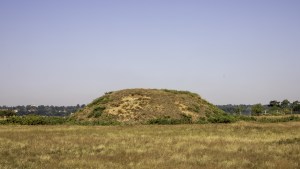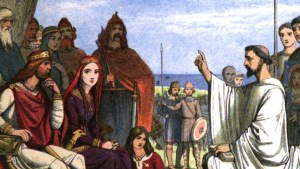Lenten Campaign 2025
This content is free of charge, as are all our articles.
Support us with a donation that is tax-deductible and enable us to continue to reach millions of readers.
King Arthur is surely among the most iconic figures in British folklore. His story first comes to our attention through the writings of early saints and monks. Interestingly, Arthur’s name does not appear in the earliest accounts, but his legend is woven into the fabric of historical and mythological narrative through the works of devout men who chronicled the tumultuous times of early Britain.
The first explicit mention of King Arthur by name is found in the Historia Brittonum, written around 820 by the monk Nennius. Nennius’ text is crucial, as it consolidates various oral traditions and earlier writings into a coherent narrative that includes Arthur as a formidable warrior and leader. But who was this monk, and what inspired him to document such legends?
Nennius was a 9th-century Welsh monk. Little is known about his life, and some consider him to be yet another legend. It is said that he was a student of Elvodugus – the famed Welsh bishop Elfodd of Bangor. Nennius’ Historia Brittonum reflects the historical and cultural milieu of post-Roman Britain, a period marked by invasions and political instability. Nennius’ intention was probably to provide a record of British history that would inspire and instruct his contemporaries and future generations. His compilation includes not only the deeds of Arthur, but also a broader historical account of Britain from a distinctly Christian perspective.

But the groundwork for Nennius’ work was laid by earlier scholars, most notably St. Gildas. St. Gildas was a 6th-century British cleric and missionary known for his work De Excidio et Conquestu Britanniae (“On the Destruction and Conquest of Britain”). Gildas’ account, while not mentioning Arthur by name, describes the chaotic and violent period following the departure of the Roman legions from Britain. He does speak, though, of a heroic leader who rallied the Britons against the invading Saxons – a figure who closely resembles later depictions of Arthur.
One of earliest British historians
St. Gildas, born around 500, was one of the earliest British historians, and a prominent figure in the Christian Church. He was a pious monk and a scholar dedicated to preserving the history of his people. His writings were deeply influenced by his religious beliefs, and aimed to call his fellow Britons to moral righteousness.
Even if historically inaccurate (because of their blending of myth, history, and hagiography), the accounts of these early saints and monks are invaluable. They provide not only historical data, but also a window into the values and beliefs of early medieval Christianity in Britain. Their works were driven by a desire to document divine providence in human affairs, and to offer moral lessons through the lens of history.
In short, the legend of King Arthur owes much to the efforts of religious scholars such as Nennius and St. Gildas. Their writings blend the sacred with the heroic to create a narrative that has captured the imagination for centuries. Through their pious scholarship, the figure of Arthur emerged from the mists of legend into the annals of recorded history, embodying the virtues and struggles of early Christian Britain.



